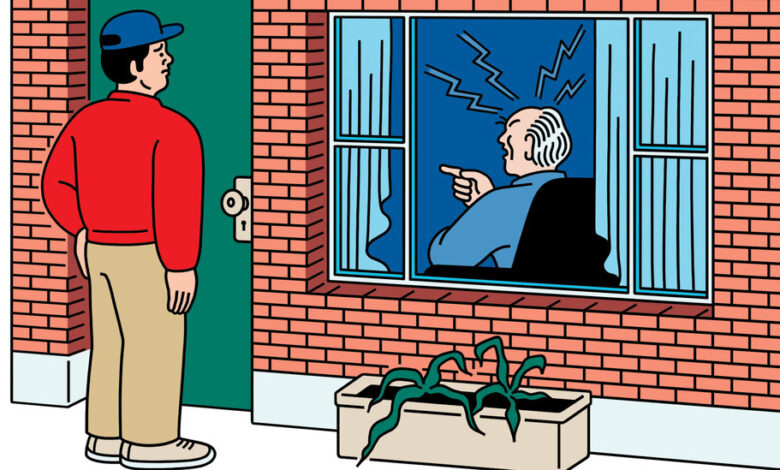The Elderly Man I’ve Been Helping Turns Out to Be a Bigot. What Do I Do?

I have been visiting and helping out a solitary older gentleman through a mutual-aid organization. He clearly values our time together. But on a recent visit he revealed repugnant beliefs — that Jews control the world and Black people are genetically inferior to whites. My attempts to disabuse him went nowhere. Does my ethical obligation to help this person override a desire to reject those ideas? Does it even matter if an isolated person believes terrible things? Name Withheld
Let’s stipulate that this fellow acquired these beliefs from growing up in a community rife with prejudices. Still, the fact that they came up suggests that they’re central to who he is, just as your recognition that they’re repugnant is central to who you are. “The perfect kind of friendship,” Aristotle said, “is that of good men who resemble one another in virtue.” That’s a wildly demanding ideal, and helping out this gent doesn’t require that you be friends — being friendly will suffice. But now that you’ve gained a sense of his worldview, it may be hard to sustain positive vibes.
This doesn’t mean you can’t do anything for him or with him. As you suggest, his odious convictions aren’t likely to be doing much harm; this isn’t an “Apt Pupil” scenario. Yet the assistance you’re providing him is a matter of generosity, not of duty. The situation would be more complicated if he were in serious need and had become reliant upon you, with nobody else to take up the slack. But that isn’t what your account suggests. We’re entitled to direct our special benevolence toward people we consider worth our time. If you do decide to step back, in any case, you would be treating him with respect if you explained to him why.
I have a small handmade stuffed doll that was given to me when I was very young by a close friend of my mother’s. The doll was made to look like an old African American man. It has gray overalls and a red shirt. Its bald head is fringed with curly gray hair around the side and back like many old men have. The Disney movie “Song of the South” was popular and regarded as acceptable in the early 1950s, so my mother always called the doll Uncle Remus, after a main character in the film. I’ve always thought it curious that, though my family is of European descent, my mother’s friend gave me an African American doll.
We lived in white suburbia; we did not have any Black friends or any other connection to African American culture. My mother kept it in her dresser to protect it, and it was passed on to me after she died in 1977. It could be called a family heirloom.
Now, my issue is what to do with the doll. I’m 73, and I am thinking about how to pass on several keepsakes. The doll conjures fond associations, and while it could be seen as a representation of an elderly person, I know that it could also be regarded as a figure of an enslaved person. I feel ethically responsible not to pass on insensitive stereotypes.
I have thought about alternatives: I could give it to one of my granddaughters as a family keepsake; I could give it to some African American family (though I don’t know any personally); I could give it to the Uncle Remus Museum in Georgia; I could give it to Goodwill; or I could put it in the trash, which would seem a shame. What would be the right thing to do? Mark, South Carolina
For readers not up on their Uncle Remus: He is the fictional narrator of the Br’er Rabbit stories that Joel Chandler Harris published in the late 19th century, drawing on African American folk tales, often with African origins. Naturally, there’s plenty to be said about the cultural politics of Uncle Remus. I’m afraid, though, that your doll doesn’t have much to do with that fictional freedman. The usual image of Uncle Remus — going by the drawings in Harris’s Uncle Remus collections, and by that Disney movie, too — is of a bearded man in a peak-lapel jacket. The original illustrators, Frederick S. Church and James H. Moser, gave him spectacles, a waistcoat and even a necktie. In the movie, he wears a white button-up band-collar shirt.
What you’ve got is a doll of — what, an elderly farmer? I expect that younger members of your own white family might be embarrassed by it, sensing in it a tradition of racial condescension. Destroying it, however, would make sense only if it were impossible for someone to enjoy it without participating in that tradition. I don’t think that’s true. A museum isn’t likely to take an interest in this item, unless there’s something special about it you didn’t mention. But you could sell it on eBay or, yes, donate it to Goodwill; there’s at least a chance that it will end up in the hands of someone who will appreciate it in the right spirit.
We are a group of gay men who have known one another for several years. One of the men came out a few years ago. I’ll call him John. John recently came out again, now as transgender. John’s desire that we call him by a new name (correcting us when we refer to him as John), his need to talk with us incessantly about his transition, his change of clothing, the slow physical effects of the hormones he is taking — all of this has become a challenge for the rest of the group when we hang around together.
But our real concern is that we recently planned a gay tour in Mexico. The tour is very structured, with little personal time. Our group makes up a majority of the tour.
John seems to think that we should all accept his new identity without reservation, with as much cheer and acceptance as he does for himself, not thinking or caring about how any of us might feel.
As superficial as this sounds, we no longer want our friend John to join us. There are reasons that gay men enjoy traveling together, and it’s not to hang around with a woman.
Straight people imagine that gay men view trans men/women in the same inclusive bubble as other gay men. We are all, so the acronym implies, part of that big, progressive L.G.B.T.Q.+ umbrella. Not true. In general, gay men (for all of our performances of femininity) do not understand trans identity — we don’t commonly socialize together.
The bottom line is that John’s presence will spoil a much-anticipated and expensive vacation. Do we just put up or shut up? Should we talk? If so, about what? Name Withheld
You insist on referring to your friend by a male name, representing the one she used before she transitioned. That indicates a basic lack of empathy; “deadnaming” people like this — using the name they used before transitioning — undermines the process of inhabiting the gender identities they have affirmed, and is, in any case, disrespectful. If the other cis men in your group really think of her in this way and resist acknowledging her transition, then joining you on vacation is probably not a good idea for her.
She has obviously done a lot to explain her transition to you. (That’s one of the burdens uninformed cis people impose on trans people.) You should let her know that you’re still struggling with it. Once she recognizes that, she may well decide herself that she doesn’t want to go on a vacation with you.
A word about your vacation plans: People get together on the basis of social identities all the time. There are plenty of travel clubs with names like Black Girls Travel Too, Latinas Who Travel and Shefari. Small social groups, morally and legally, don’t have to abide by the rules that govern public accommodations; in “The Little Rascals,” the He-Man Womun Haters Club (which Spanky restarts in a reaction to a boys-excluding party given by the McGillicuddy girls) would properly not attract the attention of the Equal Employment Opportunity Commission. And a female traveling companion would, I grant, be at odds with your objective of having an all-gay-men holiday. (I’ve also read that many gay clubs in Mexico have been distressingly hostile to trans women.)
Still, your letter suggests that your problem is not so much the presence of a woman as the presence of a trans woman. If so, you have a way to go in treating your friend with the respect she deserves.
Kwame Anthony Appiah teaches philosophy at N.Y.U. His books include “Cosmopolitanism,” “The Honor Code” and “The Lies That Bind: Rethinking Identity.” To submit a query: Send an email to [email protected]; or send mail to The Ethicist, The New York Times Magazine, 620 Eighth Avenue, New York, N.Y. 10018. (Include a daytime phone number.)




